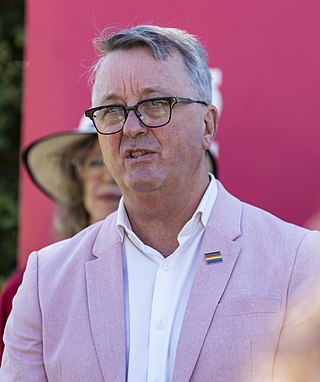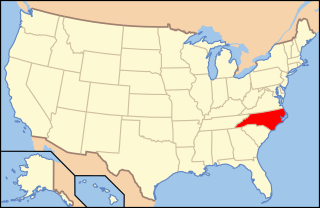
The Government of Jersey is the executive body of the States of Jersey and is the central government of the Bailiwick of Jersey. The government is led by the Chief Minister, who nominates all the remaining ministers, all elected by the States Assembly.

The Queensland Government is the state government of Queensland, Australia, a parliamentary constitutional monarchy. Government is formed by the party or coalition that has gained a majority in the state Legislative Assembly, with the governor officially appointmenting office-holders. The first government of Queensland was formed in 1859 when Queensland separated from New South Wales under the state constitution. Since federation in 1901, Queensland has been a state of Australia, with the Constitution of Australia regulating its relationship with the federal government.

The Department of Health and Aged Care (DHAC), formerly the Department of Health, is a department of the Australian Government responsible for health research, funding, promotion and regulation in Australia. Primary health care and aged care services are overseen by DHAC, while tertiary health services are administered by state and territory governments. The department is responsible for programs such as Medicare, the Pharmaceutical Benefits Scheme, and agencies such as the Therapeutic Goods Administration and the National Health and Medical Research Council.

Brian Leslie HoweAO is a retired Australian politician and Uniting Church minister. He served as the eighth deputy prime minister of Australia and the deputy leader of the Labor Party from 1991 to 1995, under Bob Hawke and Paul Keating. He was a government minister continuously from 1983 to 1996, and a member of the House of Representatives from 1977 to 1996, representing the Division of Batman in Victoria.

The Minister for Social Services is the Australian federal government minister who oversees Australian Government social services, including mental health, families and children's policy, and support for carers and people with disabilities, and seniors. Amanda Rishworth was appointed as minister on 1 June 2022, following the Australian federal election in 2022.

The Minister for Government Services is the minister in the Government of Australia responsible for Services Australia. The current minister since 1 June 2022 is the Hon Bill Shorten MP, who also serves as Minister for the National Disability Insurance Scheme.

Martin Peter Foley is a former Australian politician. He was a Labor Party member of the Victorian Legislative Assembly between 2007 and 2022, representing Albert Park. He was the Minister for Equality in the First and Second Andrews Ministry between December 2014 and June 2022 and the Minister for Health and Minister for Ambulance Services between September 2020 and June 2022. He was previously the Minister for Mental Health and Minister for Creative Industries prior to September 2020.

Ambulance Victoria (AV), a Victorian agency of the Department of Health, is the statutory provider of pre-hospital emergency care and ambulance services in Victoria. Ambulance Victoria was formed on 1 July 2008 with the merger of the Metropolitan Ambulance Service (MAS), Rural Ambulance Victoria (RAV), and the Alexandra District Ambulance Service (ADAS). Ambulance Victoria has undergone significant reform since 2008.
The Department of Health (DoH), previously the Department of Health and Human Services (DHHS) is the Tasmanian Government department responsible for hospitals, ambulances and community health, while also supporting related areas such as primary healthcare. The department is the largest of all the Tasmanian Government agencies.

The state of North Carolina is undertaking a comprehensive policy shift on how the government budgets for and manages resources for mental health, developmental disability, and substance abuse services. The 1915 (b)(c) Medicaid Waiver Program was chosen by the North Carolina Department of Health & Human Services, Division of Medical Assistance as a way to control and more accurately budget for the rising costs of Medicaid funded services. The 1915 (b)(c) Waiver Program was initially implemented at one pilot site in 2005 and evaluated for several years. Two expansion sites were then added in 2012. Full statewide implementation is expected by July 1, 2013.
Council for Canadians with Disabilities (CCD), formerly known as the Coalition of Provincial Organizations of the Handicapped (COPOH), was created by people with disabilities in 1976 to provide support for all people with disabilities who seek the opportunity to go to school, work, volunteer, have a family, and participate in recreational, sport and cultural activities. The CCD is a national human rights organization of people with disabilities working for an accessible and inclusive Canada. In the 1970s, the CCD became a permanent part of the disability rights movement and it became a fluid entity that includes people with a range of different disabilities. To manage the work that will lead to the achievement of this goal, CCD established the following Committees to guide their activities in key areas:
- Human Rights Committee: Identifies Human Rights Committee issues of concern to persons with disabilities that could be addressed through law reform initiatives.
- Social Policy Committee: Identifies Social Policy Committee issues of national concern to persons with disabilities.
- Transportation Committee
- International Development Committee: Provides advice to CCD National Council on reforms that would improve the effect of Canada's foreign aid and policy on persons with disabilities.
- Access to Technology Committee.
The Office of the Assistant Secretary for Planning and Evaluation (ASPE) is the principal advisory group to the United States Secretary of the Department of Health and Human Services (HHS) on policy development and provides coordination and support for HHS's strategic and policy planning, planning and development of legislation, program evaluation, data gathering, policy-related research, and regulatory program.
The Department of Transport and Planning (DTP) is a government department in Victoria, Australia. Commencing operation on 1 January 2019 as the Department of Transport (DOT), the DOT was formed in machinery of government changes made by Premier Daniel Andrews after the re-election of his Labor government at the 2018 Victorian state election. The re-shuffle saw the "super-ministry" Department of Economic Development, Jobs, Transport and Resources abolished and its functions reassigned to the DOT and Department of Jobs, Precincts and Regions.
The Department of Jobs, Precincts and Regions (DJPR) was a department in Victoria, Australia. Commencing operation on 1 January 2019, the DJPR supported six ministers across 10 portfolios, broadly related to economic development.
The Department of Families, Fairness and Housing (DFFH) is a department of the Government of Victoria. Formed from the splitting of Department of Health and Human Services in the ongoing response to the COVID-19 pandemic, DFFH holds responsibility for child protection, housing and disability. It also incorporates functions formerly performed by the Department of Premier and Cabinet. These functions included veterans affairs, women and youth, multicultural affairs and LGBTQI+ equality.
The Department of Health (DH) is a department of the Government of Victoria. It was formed from the splitting of Department of Health and Human Services into the DH and the Department of Families, Fairness and Housing, in response to the COVID-19 pandemic. The DH is focused on delivery of health and wellbeing services throughout Victoria.









